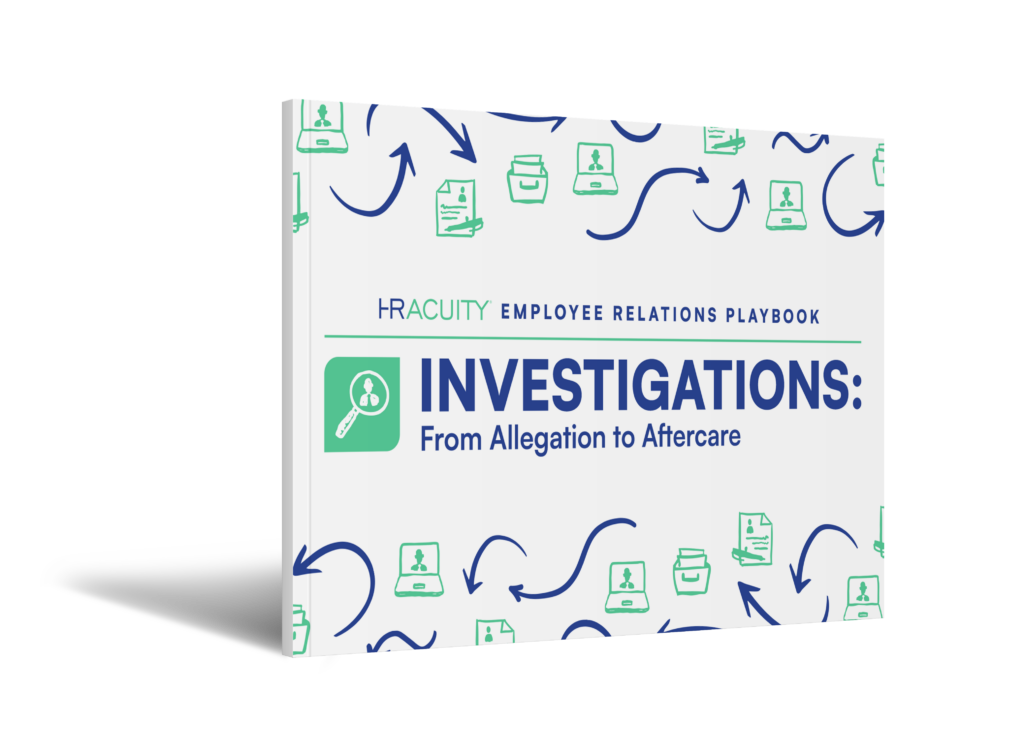Internal investigations don’t always have a happy ending. If you find that an employee has committed misconduct, it can be difficult to determine how to proceed. When handling an employee that has been accused of misconduct, you don’t want to risk the employee taking legal action or other retaliation against you, their accuser or anyone else involved.
Retaliation can lead to a hostile work environment, damage the company culture and the reputation of your organization. Not to mention the potential cost. In some previous cases, firms were forced to settle for millions of dollars. That’s enough to irreparably cripple many small to midsize businesses. This is why it’s so important to prevent retaliation derived from an internal investigation.
An overview of internal investigations
An internal investigation is a review conducted within a company to determine if there has been wrongdoing or illegal activity by a current or former employee. It’s conducted by a designated individual who has been trained on how to handle such cases, usually someone with a strong background in employee relations and analyses.
Many misconduct investigations stem from alleged violation of a company policy or practice. However, while employees have the responsibility to act in accordance with their employee handbook, managers also have a duty to manage internal investigations within the bounds of the law and their organization’s policies. For example, employers must ensure that they conduct investigations fairly and in a non-discriminatory manner, even if the employee is found guilty of misconduct.
To prevent retaliation, internal investigations must follow the proper procedures and protocols.
While the investigation process may be lengthy in some cases, eventually human resources will make a determination regarding whether or not the alleged violation has occurred and what the appropriate disciplinary action should be. Once the determination is made, the ER team should:
- Notify the employee in writing and give the opportunity to respond to the findings.
- Generate a final written statement that clearly outlines the decision and the basis for it.
- Include a description of any action that will be taken against the employee, giving them the option to appeal the decision.
- Retain any recommendations for changes in the employee’s work environment or practices that may help to prevent a similar incident from happening in the future.
- Highlight any future plans to monitor the employee’s progress and ensure that they’re meeting the expectations of their position.
- If the result of the investigation was immediate termination, the legal reason should be clearly documented.
Why do internal investigations happen?
Situations will arise, but just because your organization is dealing with investigations, it doesn’t mean that this is a bad look for your company. In fact, it means the opposite: you are seeking to resolve issues properly and become a better, stronger organization! They help to maintain good relationships between employees and management. Internal disciplinary policies keep the business in good standing with the public and government agencies. They also help to protect you from costly lawsuits.
The purpose of an internal investigation is to determine whether there has been a violation of the law or company policy. It may also be used to determine whether the company has suffered any damages as a result of a wrongful act.
A thorough internal investigation should be conducted before making decisions regarding any of the employees involved. The investigation should be as comprehensive as possible, completed within a timely fashion and include all relevant documents and evidence.
At the outset of an internal case, an investigator should take steps to protect the confidentiality of the investigation. This may include restricting access to documentation, preventing employees from discussing the case and maintaining a separate workspace for the employee relations team. The investigator should also consult with legal counsel if necessary to ensure that any obligations are being met.
Download the Employee Relations Playbook
Everything you need to know from Allegation to Aftercare.

What is retaliation in an internal investigation?
The investigation process isn’t a simple one. There are many people involved, including the investigator, the complainant, the subject, and witnesses. In the end, it can be difficult to complete an investigation without creating tension and distrust among the parties involved.
For cases that result in disciplinary action, the effects of the investigation can be lengthy. Retaliation is often a concern. Retaliation is defined as any adverse action taken by one or more people against another person because of the activities or decisions of that person. Retaliation can take many forms.
It can be direct in that the person being retaliated against directly experiences some form of action, such as through an angry email or physical harm to company property, such as vandalism. Indirectly, the retaliated person(s) may be subjected to measures that have nothing to do with the initial incident. Their performance reviews might suffer, they might miss out on a promotion or development opportunity, or they might not receive a pay increase or other compensation.
Taking caution to prevent retaliation shouldn’t only be focused on the alleged employee. The confidential nature of an investigation can lead to certain team members perceiving that a brief, alleged act of misconduct has gone without consequence, especially since there may not be any visible repercussions. When a co-worker makes a serious accusation and the response isn’t what they hoped for, they may feel as though their worries were not given enough consideration. Retaliation against the accused employee or even the investigator can therefore follow.
In some cases, retaliation can be in the form of reprisal actions from the employer. If an employer feels that an investigation is not going according to plan, they could also take steps to retaliate against the employee. This may include terminating the employee, changing their job duties or even creating a hostile work environment. It’s up to the employee relations team to find out if retaliation is taking place in any form and take appropriate action to stop it.
How to prevent retaliation after an investigation
For the investigator, the key to preventing retaliation is to make sure that the employee is aware of the investigation and that it’s being conducted fairly. This can be accomplished through a preliminary meeting with the employee in question to explain the case, its purpose, the procedures and the time frame in which the investigation may conclude. If the employee is not cooperative or isn’t following procedures, there need to be specific consequences in addition to those connected to the initial wrongdoing.
Here are some additional tips to help prevent retaliation after an investigation:
- Avoid biases and prejudices that may affect your ability to understand the evidence impartially. This includes evading any preconceived notions about the employee. Anonymizing important information such as witness names and details can help.
- Stay calm and professional throughout the process. If any of the evidence or parties make you upset, try to remain as objective as possible. This is difficult to do in many cases where the evidence or parties involved may be highly emotional, but your ability to remain calm can help you make the best decisions.
- Follow proper legislation and regulations to ensure your internal investigations are legally compliant. This includes following the procedures of the relevant employment law.
- Notify all employees involved when claims are resolved as an “unsubstantiated claim.”. Even though the claim may not have been substantial enough to merit further investigation, the employees should be notified and given an opportunity to provide any additional information. If people are left to speculate, it may lead to negative effects on the workplace through unnecessary gossip or rumors.
- Have a post-investigation review to determine if there are any further improvements that can be made. Internal investigations are rarely perfect, and the results of a review can often lead to new techniques and procedures that further improve the investigative process.
- Find ways to address ill feelings between employees after an allegation. Sometimes this can be done by offering counseling to both parties. If the employees can be reconciled, it can help to prevent the situation from escalating.
- Don’t just assume a happy ending and that employees will continue on with their work as if nothing happened. If the allegations are found to be untrue, remind employees that they each have the right to come forward with concerns, and there shouldn’t be a fear of retaliation. This will help to take some of the heat off of the subject and hopefully persuade them to let go of their resentment.
Remember that the employee making the allegations shouldn’t be punished for speaking out. There are many instances where the solution directly involves the complainant in a way that could negatively affect them. For example, if an employee comes forward with concerns that a manager is being discriminatory towards them because of their sexual orientation. The employee might be moved to another department, which could be considered a demotion in their eyes, instead of solving the initial issue.
Employee relations software such as HR Acuity’s case management platform can help you manage internal investigations, including reviewing evidence, interviewing witnesses and creating reports. The software can also help you keep track of important dates, deadlines and deliverables, which will ensure that the investigation stays within the necessary timeline. Preventing retaliation is a difficult task, but HR Acuity can help. Contact us today to learn more about how we can help you manage your internal investigations.



